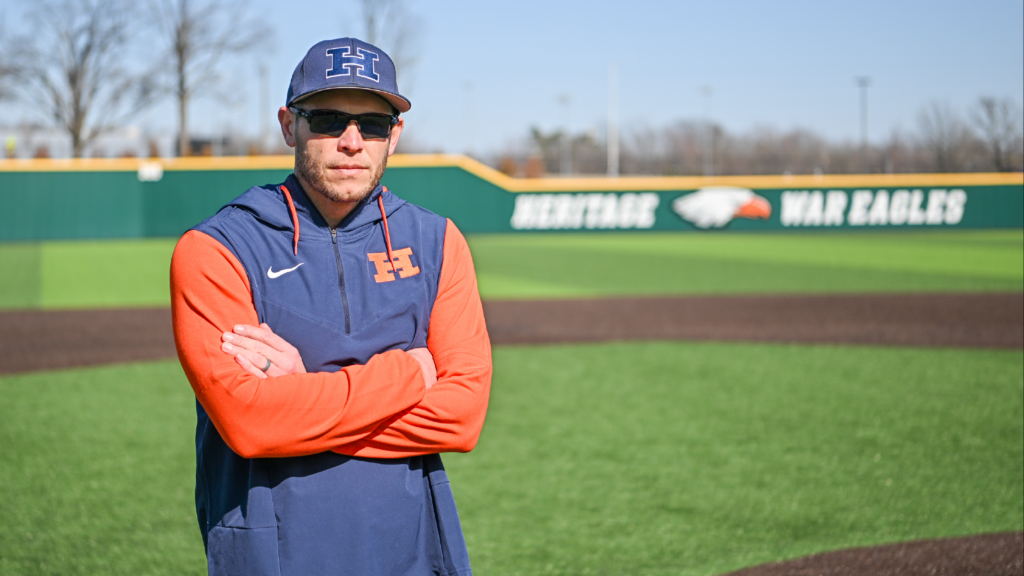GAME CHANGER WITH BRIAN WALKER
By Don Lowe | Photos by Mark Strickland Photos

Rogers Heritage War Eagles Baseball Head Coach Brian Walker is in his 4th year at the helm here. Coach Walker was born and raised not too far from here in Tulsa, Okla. and he graduated from Tulsa Union High School in 2003. Although Coach Walker left his home state not long after, he didn’t venture too far away while opting for college at the University of Arkansas, where he was a catcher for the Razorbacks and played on three NCAA Regional teams, before graduating in 2007 with a B.S. in Kinesiology M.S. M.A.T.
As he began to build his coaching resume, Coach Walker remained at his collegiate alma mater as a Volunteer Assistant with catchers and hitters on Razorbacks longtime Head Coach Dave Van Horn’s staff from 2010–13. After that, Coach Walker served as Assistant Coach and Recruiting Coordinator for the Wichita State Shockers from 2013–16.
Of course, Coach Walker’s family is most important to him with his wife, Mckenzi, and their four children, Claire (13), Joe (13), Ryan (7), and Hannah (5) being what gives him the greatest happiness. “My family is my stronghold,” Coach Walker assured. “And being a husband and father is my greatest time spent and the joy of my life.”
While Coach Walker preferred not to mention one person who has been the greatest influence on him, he did say that his favorite professional baseball coach is Atlanta Braves Assistant Hitting Coach Bobby Magallanes. “He invested in me before I was ready to become the man I am today,” Coach Walker reflected. “He built a relationship with me that has changed my life beyond baseball.”
Q & A
So far in your time at Rogers Heritage and in the Rogers area, what makes this school and community so special?
The community at Rogers Heritage is the comparison of the world walking through our hallways. We have so much cultural diversity and so many different backgrounds, it creates a true depiction of what the world looks like. The community is supportive of our educators and creates opportunities for our students unique to other districts.
What are the biggest changes in high school baseball across Northwest Arkansas during the time you’ve been here?
High school baseball is a difficult navigation. The season is very short with 30 games and being played in 10 weeks. An added caveat is the way the conference aligns with the Arkansas Activities Association (AAA) post-season and our first game of the regular season having direct playoff implications. It is a great opportunity for me and my staff as we get to prepare our players like professional baseball, where every game matters regarding the post-season.
What do you believe are the greatest challenges in coaching high school baseball?
Navigating how the world says 14- to 18-year-old boys are supposed to act and teaching them how to be accountable to themselves, their families, their community, and their team requires daily dialogue. Student-athletes are privy to so much information that giving them a resource to navigate that information is key in their growth on and off the field. This opportunity is one that few get to embrace. Daily, my staff and I get to be around these young men and help them navigate their lives, all the while teaching them how to be accountable, selfless, trustworthy young people, which is a challenge as they are still developing at different rates, both mentally and physically.
What do you consider the most rewarding and satisfying aspect of coaching high school baseball?
I see young boys learn how to become young men and be prepared to be successful students, people, employees, husbands, fathers, and members of society. My staff and I get to teach them what this looks like daily. Watching our players impact on my children as well as my staff’s children and how they interact with them is rewarding. The impact these young men make on campus, at home, and on my staff is the reason we do what we do. When we see them come back and how proud they are to invest in the next generation of players here, while explaining their story, that’s the type of impact this program has on our young people.
What do you believe is most important in building a solid foundation and having a team that consistently challenges for conference championships year after year?
Accountability, ownership, sacrifice, discipline, service, and honesty. All these words are the pillars to building a program’s foundation. We demand this daily and it is the only way to be consistent in life. We must be accountable to all pillars to be successful. Significance over success is a foundational principle, and each team is posed with the opportunity of creating their own significance as leadership opportunities arise each year with different players. Significance lasts longer than any one teams’ success.
What are the challenges to helping high school baseball players develop skills to play collegiately when they are pulled in many different directions, including travel ball during the summer as well as playing other sports?
We’re fortunate to be with our players almost year-round in some capacity. Summer ball is important and we’re fortunate to have so many options for our players. We use the summer to help build strength during the week as they’re playing with their respective teams on the weekends. Regarding players playing other sports, our program fully supports multi-sport athletes as we believe it’s important for our school and our student-athletes to be well-rounded. The athleticism built by other sports makes better baseball players. College baseball is a difficult business. A player with the ability to play at the next level not only must have the athletic ability, but the work ethic to navigate being a student-athlete. We hold our players to the same standard. By having collegiate experience on our staff, we can help prepare our athletes for the next level as we understand the expectations.
What do you consider your greatest accomplishments as both an educator and high school baseball head coach?
My greatest accomplishment is watching our players grow from young boys to men. They experience so much growth during their time in our program. A smile comes across my face looking back at the impact that my staff and I get to have on these young men. As an educator, it’s getting to know so many promising young people, seeing their development and growth and watching them navigate into the people they want to become. This growth is daily and requires so much investment. But the return on investment is the greatest accomplishment, while watching their individual growth and success.
Who has been the greatest influence from the beginning of your coaching career?
Singling out one person would be unfair to all those that have impacted me as a coach. From the discipline by my father and empathy from my mother, to high school coaches that helped navigate that time in my life, to my college coach (Arkansas Razorbacks Head Coach Dave Van Horn), who is a legend and taught me how to unemotionally make decisions, to my managers and coaches in professional baseball that led me as a person just as much as a player, to the men that poured into me as a young adult to grow as a husband and father, which furthered me as a coach, to my wife who holds me accountable with the expectations of a husband and father, to the administration I currently work under that empowers me daily in all facets of life, to my colleagues that impact me and help me see perspectives I may not see readily, I have been influenced by so many people that decided to take the time to invest in me as a person and as a coach. And that investment continues daily.
What are some of your interests and hobbies away from the baseball diamond?
I enjoy reading and furthering my capacity as an educator. I am constantly trying to evolve as a person, and I embrace the opportunity to learn from those all around me and garner as much knowledge as possible.


